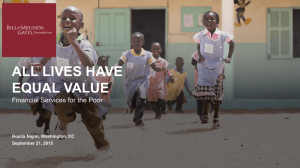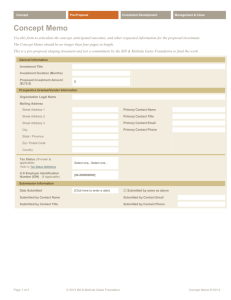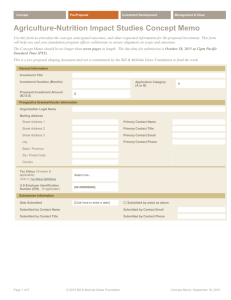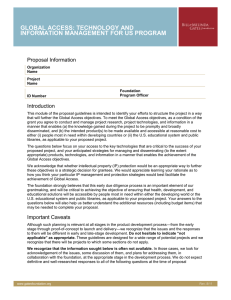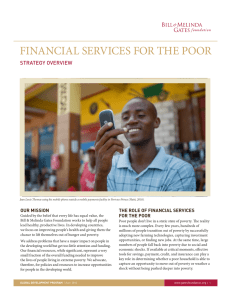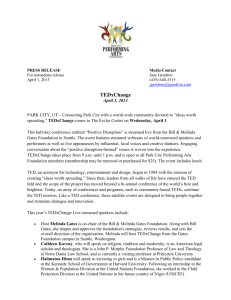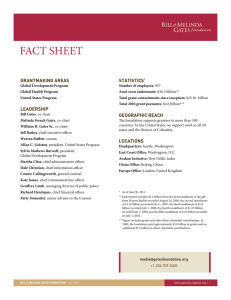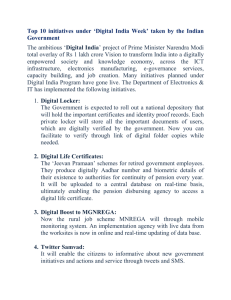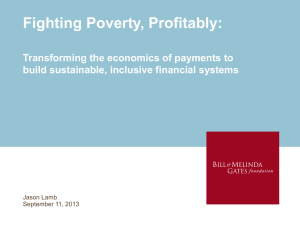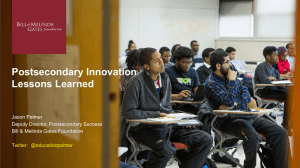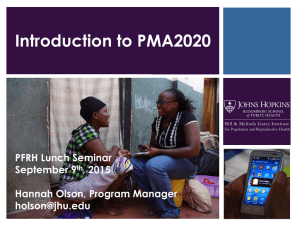FINANCIAL SERVICES FOR THE POOR ITU December 2014 David Lubinski, Senior Program Officer
advertisement
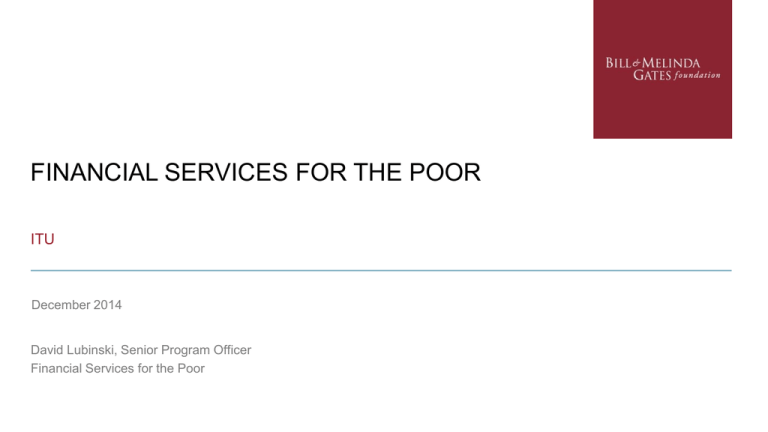
FINANCIAL SERVICES FOR THE POOR ITU December 2014 David Lubinski, Senior Program Officer Financial Services for the Poor OUR GLOBAL REACH AND PRESENCE 1,200 2012 active grantees Seattle Europe and Middle East Office China Washington, D.C. India Nigeria Ethiopia South Africa $3.4B 2012 grant payments 1,100 2012 employees worldwide © Bill & Melinda Gates Foundation | 3 WHAT WE DO GLOBAL HEALTH GLOBAL DEVELOPMENT GLOBAL POLICY & ADVOCACY UNITED STATES PROGRAM COMMUNICATIONS © Bill & Melinda Gates Foundation | 4 GLOBAL DEVELOPMENT Delivering health and development solutions that help people lift themselves out of poverty. Programs: Agricultural Development Emergency Response Family Planning Financial Services for the Poor Global Libraries Maternal, Neonatal & Child Health Nutrition Polio Water, Sanitation & Hygiene FINANCIAL SERVICES FOR THE POOR Our approach has three mutually reinforcing objectives : • Reducing the amount of time and money that poor people must spend to conduct f inancial transactions • Increasing poor people’s capacity to weather f inancial shocks and capture income-generating opportunities • Generating economy-wide ef f iciencies by digitally connecting large numbers of poor people to one another, to other consumers, to f inancial services providers, to government services, and to businesses. THEORY OF CHANGE – FINANCIAL SERVICES FOR THE POOR Intervention areas Outputs Expand the Digital Financial Infrastructure Expand the digital financial infrastructure so that poor people can access digital money and use it to transact with their peers, businesses, and government Accounts which can connect digitally to other accounts Population within 5km of access point Reduced transaction costs Drive Participation in the Digital Financial System Create value that results in poor people joining the system because financial service providers design products to meet the needs of the poor and can offer them profitably <$2/day adults use a digital account Digital bulk payments Number/type of financial products available digitally Foster Regulations and Policy Adapt regulations to enable poor people to open accounts, to allow providers to outsource distribution, and to protect users Reforms adopted on emoney account issuing, KYC requirements, and distribution Outcomes Impact Fewer people fall into poverty Poor people manage their money digitally By 2035, 80% of adults worldwide and 60% of <$2/day adults actively use a digital account to access at least one financial service beyond payments (credit, savings, insurance) More people More people move outof of move out poverty faster poverty faster © 2014 Bill & Melinda Gates Foundation | 7 FSP STRATEGIC INITIATIVES Four levers to accelerate and deepen penetration of digital financial services for the poor 1 2 Digital Payment Systems at Scale Digital Financial Services at Scale Accelerate the propagation of digital payment systems into poor and rural communities in five countries with large numbers of poor people and adequate connectivity (i.e., Bangladesh, India, Indonesia, Nigeria, and Pakistan) ~35% of resources Accelerate and deepen the penetration of digital financial services beyond payments in three transition counties (i.e., Kenya, Tanzania, and Uganda) ~35% of resources 3 Global Partnerships Shape and accelerate efforts of governments, donors, global standard-setting bodies, and the private sector to maximize their collective impact on the poor’s access to digital financial services ~15% of resources 4 Technology and Innovation Nurture innovations that could, in the medium- to long-term, create a step-change improvement in delivering digital financial services at scale ~15% of resources © 2014 Bill & Melinda Gates Foundation | 8 THE INCLUSIVE DIGITAL ECONOMY INCLUDES EVERYONE THANK YOU
